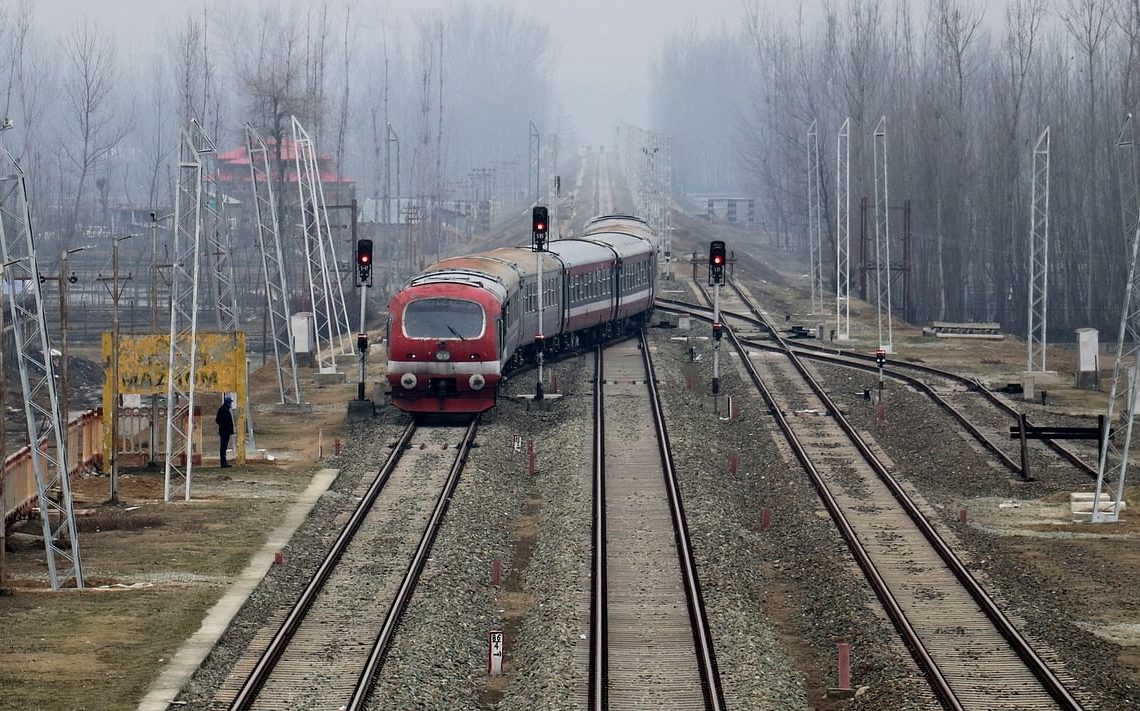Marking a significant accomplishment in Kashmir’s railway connectivity, Kashmir will be linked to Kanyakumari through railway by the next year while the arrangements for the same are being finalized, officials on Thursday said.
Chief Area Manager (CAM) Kashmir, Saqib Yousuf Yatoo (IRTS) told Rising Kashmir that the railway link of Kashmir will connect to the rest of the country in 2024 and for that all the arrangements are being done.
He said train tracks are being redeveloped in Budgam. Many long distance trains will reach Kashmir and for that work on many vital projects is underway including re-modelling at Budgam station.
“Very soon people will see that the train from Kashmir will be linked to other parts of the country. Food Courts, Parking slots, VVIP waiting rooms and other facilities are being upgraded at the Budgam railway station, he said.
A senior officer at railways announced the imminent inauguration of a newly constructed 14.869-kilometer line in the Banihal-Khari section of Firozpur Division. “The electrified train services are poised to begin soon, marking a significant advancement in the area’s transportation infrastructure,” he said.
As part of the Amrit Mahotsav celebrations, the official said a high-speed trial for the Banihal-Khari section is scheduled on January 3, 2024. “The Commissioner of Railway Safety will supervise the inspection, ensuring strict adherence to safety standards and operational efficiency. The trial will be conducted by a special train following a comprehensive trolley inspection,” he said.
The official said the biggest milestone in 2023 was the completion of the 3209 metres long Tunnel T-1, situated between Katra and Reasi Stations. It marked the successful culmination of tunneling activities under the entire USBRL Project.
It is constructed by the Konkan Railway Corporation Ltd. for Northern Railway as part of National Projects, Tunnel T-1 is nestled at the foothills of Trikuta Hills near Katra in Reasi District.
He said the tunnel’s alignment traverses the lesser Himalayas, presenting challenges with highly jointed and fractured dolomite. “Notably, a section spanning 300-350m intersects a major Shear Zone known as the Main Boundary Thrust (MBT), posing a formidable challenge due to water ingress,” he said.
The official said initially employing conventional NATM (New Austrian Tunneling Method) philosophy, the tunneling approach was later switched to the I-System of Tunneling. He said this breakthrough is a pivotal stride towards realizing the dream of connecting the Kashmir valley with the rest of India. Despite the achievement, there remains approximately 318m of excavation in benching and 680m of concrete lining to be completed.
“The dedicated efforts are ongoing 24/7 to swiftly conclude the outstanding tasks, bringing the Katra–Banihal railway line closer to its commissioning and enhancing connectivity in the region,” he added.
Apart from this, Railway Minister Ashwini Vaishnaw recently approved Final Location Survey (FLS) of five new railway lines in the Kashmir division. The sanctioned projects also comprise the doubling of the Baramulla-Banihal section (135.5 kilometers), he said. The Minister also said that there has been a five times increase in the annual budget allocation for rail infrastructure projects in Jammu and Kashmir, marking a fivefold rise this year.
“There is a surge from an average outlay of Rs 1044 crore per year from 2009 to 2014 to an impressive Rs 6003 crores in the fiscal year 2023-24. The progress is particularly visible in the Udhampur-Srinagar-Baramulla Rail Link (USBRL) Project, where 161 km out of the total 272 km has already been commissioned,” he said.
Minister said said Chenab railway bridge as an engineering marvel and it is one of the highest bridges in the world and the highest railway bridge in the entire country.
“It is higher than the Eiffel Tower. All the tests have been done and all have been successful. High-velocity winds, extreme temperature, earthquake-prone area, hydrological impact, everything has been studied in detail,” he said.

